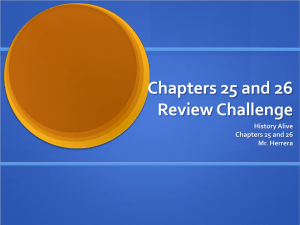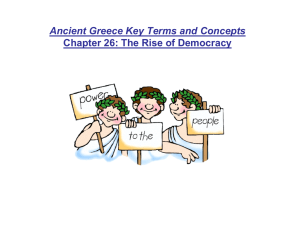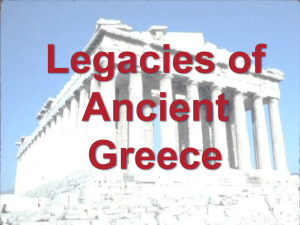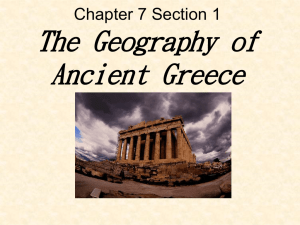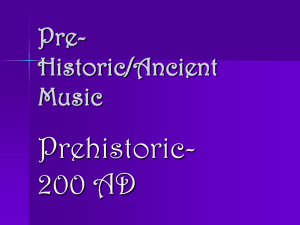Essential Questions
advertisement
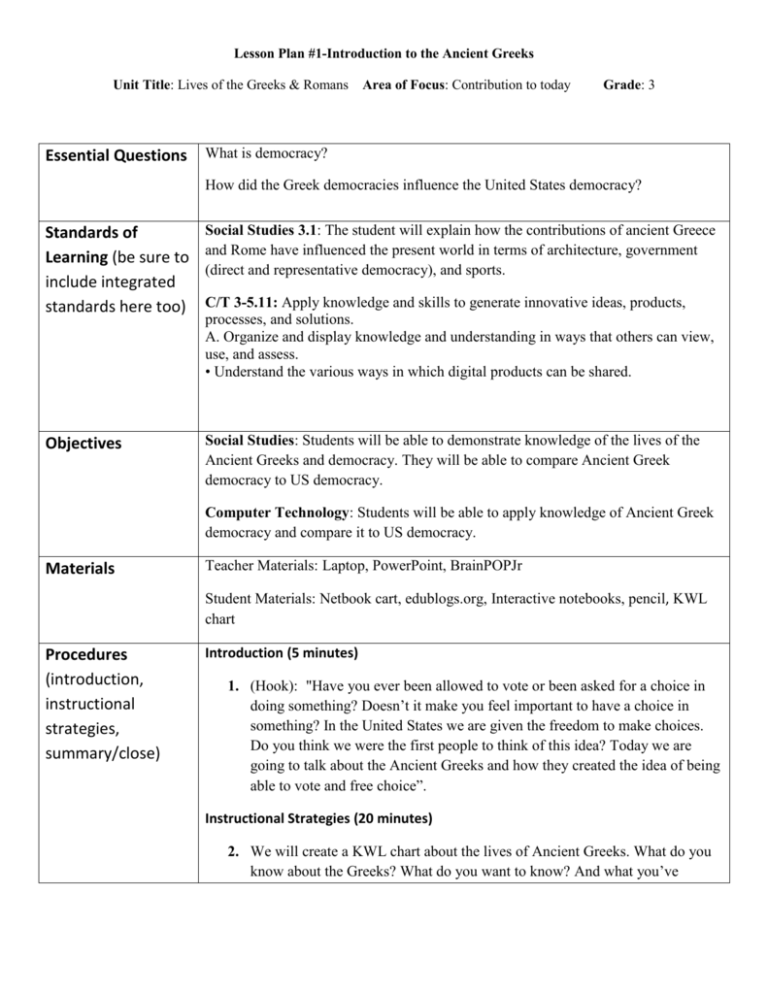
Lesson Plan #1-Introduction to the Ancient Greeks Unit Title: Lives of the Greeks & Romans Essential Questions Area of Focus: Contribution to today Grade: 3 What is democracy? How did the Greek democracies influence the United States democracy? Standards of Learning (be sure to include integrated standards here too) Social Studies 3.1: The student will explain how the contributions of ancient Greece and Rome have influenced the present world in terms of architecture, government (direct and representative democracy), and sports. Objectives Social Studies: Students will be able to demonstrate knowledge of the lives of the Ancient Greeks and democracy. They will be able to compare Ancient Greek democracy to US democracy. C/T 3-5.11: Apply knowledge and skills to generate innovative ideas, products, processes, and solutions. A. Organize and display knowledge and understanding in ways that others can view, use, and assess. • Understand the various ways in which digital products can be shared. Computer Technology: Students will be able to apply knowledge of Ancient Greek democracy and compare it to US democracy. Materials Teacher Materials: Laptop, PowerPoint, BrainPOPJr Student Materials: Netbook cart, edublogs.org, Interactive notebooks, pencil, KWL chart Procedures (introduction, instructional strategies, summary/close) Introduction (5 minutes) 1. (Hook): "Have you ever been allowed to vote or been asked for a choice in doing something? Doesn’t it make you feel important to have a choice in something? In the United States we are given the freedom to make choices. Do you think we were the first people to think of this idea? Today we are going to talk about the Ancient Greeks and how they created the idea of being able to vote and free choice”. Instructional Strategies (20 minutes) 2. We will create a KWL chart about the lives of Ancient Greeks. What do you know about the Greeks? What do you want to know? And what you’ve Lesson Plan #1-Introduction to the Ancient Greeks Unit Title: Lives of the Greeks & Romans 3. 4. 5. 6. 7. Area of Focus: Contribution to today Grade: 3 learned. I will first ask the students what they know about Ancient Greece and democracy (I anticipate they may mention Greek gods and goddesses like Hercules. They may make the connection to Percy Jackson and the Lightening Thief.) This is the first time the students will be exposed to Ancient Greece so their background knowledge may be very limited, and that’s okay! Based my WATT interview only 1 out of the 4 students had any real knowledge of the Ancient Greeks. Next I will ask them what they want to know about democracy in Ancient Greece. I anticipate students wanting to know things like: do they have a president? Who has all the power? Who is allowed to vote? “Let’s give Tim and Moby a chance to explain democracy to us”. After the video, we will answer the questions as a class. Next, we will go through the SMART board PowerPoint discussing Ancient Greece and it’s democracy. What is a direct democracy? What is a representative democracy? Which one did Ancient Greece have? Who was allowed to participate? Which form of government do we have in the U.S. today? During this instruction time, we will be doing “think, pair, share”. Especially to discuss the critical thinking portion of the government in comparison to ours. I really want to get the students engaged and thinking about how Greek democracy is like ours. Summary/Close (10-15 minutes) 6. Students will then have a chance to complete their blog post. I will give them about 10 minutes to work on it. They will be able to finish it during their Language Arts block when we do the Daily 5. After this, we will complete the KWL chart. What did we learn about Ancient Greek democracy? 7. We will discuss how Ancient Greek democracy is similar to democracy in the United States. I will ask them to keep thinking about what our government would be like today had the Greeks not invented democracy. Lesson Plan #1-Introduction to the Ancient Greeks Unit Title: Lives of the Greeks & Romans Area of Focus: Contribution to today Grade: 3 Formative Assessment The formative assessment for this lesson is a blog post. Throughout this unit students will be keeping a blog through edublogs.org. After each lesson I will have a critical thinking/application question for students to answer on their blogs. This assessment will allow me to see what students understand and if a topic needs to be explained again. The question for this posting will be: Name one way in which the Greek government its similar to our government today. Name one way is it different. Why do you think it is different? Differentiation The third grade class I’m designing this lesson for is an ESL class. Most of the class is fluent in English; a couple of students need more assistance. Typically they are pulled during social studies to work with the reading specialists. If they are in class during the lesson, I would make sure to have a lot of images to go along with the content material. I will also have them focus on learning the vocabulary, so that they can learn the basic concept of democracy. The BrainPOPJr video will also help them get a good picture in their head of Ancient Greece. I would have the students answer a simpler question to post on their blog. I think if the students could answer the question “what is democracy”? I would know they are retaining information from the lesson. Multiple Intelligences This lesson incorporates various activities to support multiple learning styles: Technology Integration (if applicable) Students will be able to show organize and display their knowledge of Greek democracy through a blog. Throughout this unit students will be keeping a blog. They will be answering various questions to show that they not only understand the lesson but also can think critically and apply their knowledge. Text based visual: text from Notebook Presentation, text from worksheet Graphic based visual: Notebook presentation of Ancient Greece, pictures of Ancient Greece Auditory passive: teacher instruction of Ancient Greek life and democracy Auditory active: BrainPOP video Inter-personal: cooperative activity- worksheet, student talk during the discussions Model: demonstration of how to complete worksheet Sensory motor: use of computer for blog post

